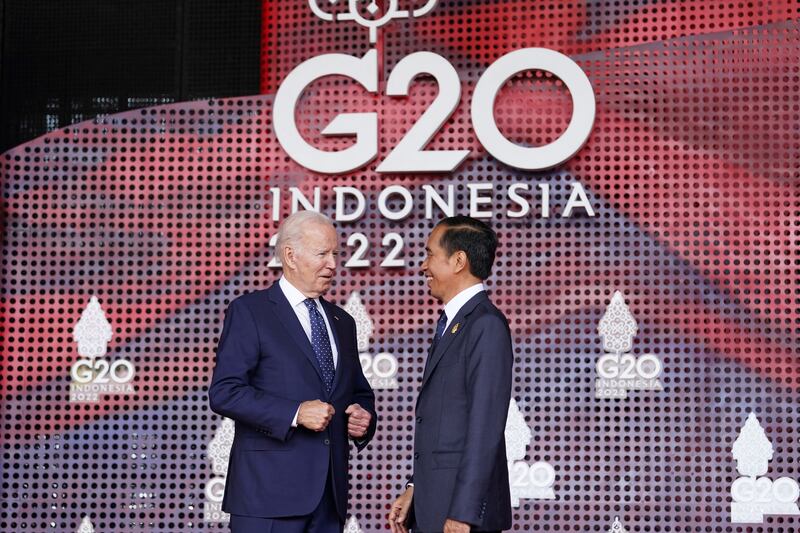The United States and its partners will offer $20 billion to help wean Indonesia, the world’s biggest coal exporter, away from fossil fuels and transition to renewable energy, U.S. President Joe Biden announced Tuesday on the sidelines of the G20 summit in Bali.
The agreement, which an American official called “the single largest country specific climate investment partnership,” will see Indonesia committing to move up its target for net zero emissions by 10 years, to 2050.
“Indonesia has shown tremendous leadership and ambition throughout the development of this partnership,” Biden said in a statement.
“The resulting new and accelerated targets demonstrate how countries can dramatically cut emissions and increase renewable energy while advancing a commitment to creating quality jobs and protecting livelihoods and communities.”
The so-called Just Energy Transition Partnership (JETP) deal, led by the U.S. and Japan, was signed by Canada, Denmark, the European Union, France, Germany, Italy, Norway, and the United Kingdom.
Coal, the dirtiest of fossil fuels, powers 65 percent of the energy needs of Indonesia, Southeast Asia’s largest and most populous country.
Indonesia is the world’s eighth most polluting country with 2 percent of global greenhouse-gas emissions to its name, according to the World Resources Institute.
The energy sector accounts for nearly half of the country’s emissions, with automotive emissions making up about one-fifth of its overall emissions, according to the Ministry of Industry.
Under the agreement with the U.S. and its partners, Indonesia will work to reduce greenhouse gas emissions and support affected communities by shifting its projected emissions peak forward by 7 years, to 2030.
Indonesia also agreed to cap power sector emissions at 290 megatons of CO2 in 2030, down from 357 megatons. The Southeast Asian country also agreed to accelerate the deployment of renewable energy so that it comprises at least 34 percent of all electricity generation by the same year.
“If you look at the investment values that are brought together under the terms of this partnership, it is arguably the single largest country specific climate investment partnership,” said John Morton, the U.S. Department of Treasury’s first climate counselor.
Morton called the emissions reductions from those targets “significant.”
“Just to put those numbers in perspective. Three hundred megatons is the equivalent of taking half the U.S. passenger cars off the road for one year,” Morton told a press conference in Bali.
“And two gigatons is equivalent to about 15 percent of global power sector emissions in any given year.”
Luhut Pandjaitan, the coordinating minister for investment and maritime affairs, said Indonesia had an important role to play in avoiding the worst impact of climate change, as the world’s largest archipelagic nation.
“Indonesia is committed to a low carbon economy, energy transition and we believe that we must not sacrifice our economy, but that we must also build a more sustainable economy for the future generation,” he said at a news conference in Bali on Tuesday.
“I promised my oldest granddaughter I will make policy that benefits the next generation. She is the strongest reminder I have,” he said.

Exxon Mobil-Pertamina agreement
Separately, Biden also announced a host of measures to help Indonesia combat climate change and illegal fishing, and build its new national capital, the White House said in a statement as the American leader met Indonesian President Joko “Jokowi” Widodo for bilateral talks in Bali on Monday.
Chief among them is a $2.5-billion agreement between Exxon Mobil and Indonesia’s state-owned oil company, Pertamina, to study development of a regional carbon capture and isolation hub in Indonesia, the statement said.
“This partnership will enable key industry sectors to decarbonize, including the refining, chemicals, cement, and steel sectors, thereby lowering carbon emissions while creating economic opportunities for Indonesian workers,” the White House said.
A joint study with ExxonMobil found carbon dioxide (CO2) potential with a capacity of up to 1 billion tons in Pertamina’s oil and gas fields, Pertamina said in a statement released on Monday.
This could allow Indonesia to permanently store emissions for the next 16 years, it said.
In May, Pertamina announced that it was working with Exxon Mobil in using carbon capture technologies in oil and gas fields off West Java area and East Kalimantan. Its director said at the time it hoped to test carbon storage by the end of 2022.
Meanwhile, a $698 million agreement with the Millennium Challenge Corporation, a U.S. government foreign aid agency, would help develop “high quality, climate-conscious transportation infrastructure” in five provinces, the statement said.
The U.S. will also help the Indonesian Maritime Security Agency (Bakamla) develop a drone program to support maritime law enforcement and counter illegal fishing, the White House said.
USAID, for its part, will help preserve vulnerable species like orangutans, elephants, tigers and rhinoceroses, while offering project management support and technical assistance for a plan to relocate Indonesia’s capital to undeveloped jungle areas in East Kalimantan.
Meanwhile on Monday, the Asian Development Bank (ADB) signed a memorandum of understanding with Indonesia to open talks to accelerate the retirement of a 660-megawatt plant in West Java.
The planned transaction aims to achieve significant carbon dioxide emission reductions through a replicable model that can be applied to other independent coal power producers in Indonesia and other countries, the ADB said.
“This MOU with our trusted partners in Indonesia is a landmark moment for ADB’s Energy Transition Mechanism and the clean energy transition it will advance,” said ADB President Masatsugu Asakawa.
